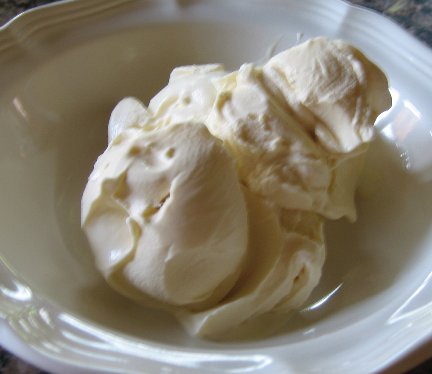Enjoy Safe Homemade Ice Cream for the Summer
TEXARKANA, Ark. –
Nothing says summer like an ice cream freezer full of homemade ice cream. I remember from my childhood, taking turns with my sister as we sat on the ice cream bucket while dad cranked to make that delicious, cold treat. Most people now use the electric models, which still makes great cold ice cream.
I remember mom in the kitchen getting everything ready. She would be standing over the stove beating farm fresh eggs, slowly adding sugar, and then stirring in cans of evaporated milk and regular whole milk. If we were lucky she would add some pureed strawberries, peaches or blackberries. I never understood why she was cooking the mixture to go in the ice cream container when dad had to crank it that much longer to get that creamy treat.
Little did I know at the time that mom was actually making a cooked custard with the egg mixture and keeping us away from a food borne illness such as salmonella.
If you just don’t want to use the cooked custard version, there is an alternative to safe "raw egg" dishes. That alternative is to substitute the raw egg called for in your recipe with the whole refrigerated or frozen whole liquid pasteurized eggs found in cartons at the grocery store in the produce dairy/eggs section or in the frozen food section. The pasteurized egg product needs to be the whole egg and not just the whites or the texture of the ice cream will not be what you expect-rich and creamy.
Besides the egg issue, there often is a concern about making ice cream that is a lower-fat version. The more fat that is in the milk or cream, the smoother the frozen mixture will be. You would be satisfied with substituting 2% milk for half-and-half or whipping cream in your recipe. However, if you choose to use 1% or skim milk, you will end up with Ice Milk with lots of ice crystals and low volume, since there is no or little fat to whip.
Homemade ice cream is one of those sometimes foods and it’s not the time to replace some or all of the sugar with artificial sweeteners. Sugar raises the freezing temperature of the mixture so you can freeze it with ice, water and salt. It also helps to make the mixture easy to dip when frozen.
Ingredients in making homemade ice cream and cooking do more than provide flavor. Cooking is a science! There is nothing wrong with making ice cream rich, creamy and smooth-using sugar, pasteurized milk with plenty of fat, and pasteurized raw eggs to make it safely. Or, choose a cooked recipe or eggless version from the beginning.
I know there are many who will say they have always made their homemade ice cream with raw eggs and have never gotten sick. But why keep tempting fate. Instead try one of these homemade ice cream recipes that follow current research-based recommendations to be safe. The one I use all the time in the summer is My Favorite Homemade Ice Cream. Don’t forget to visit the farmers market for your fresh, locally grown fruit to add to your ice cream mixture, or to add on top. They currently have Nashville peaches, blackberries, and blueberries, to name a few.
For more information, contact the Miller County Extension Office, 870-779-3609 or visit us in room 215 at the Miller County Courthouse. We're online at chadley@uada.edu, on Facebook at UAEXMillerCountyFCS/CarlaHaleyHadley, on Twitter @MillerCountyFCS or on the web at uaex.uada.edu/Miller.
No Egg Peach Ice Cream
2 1/2and one-half pounds fresh peaches - peeled, pitted and chopped
1/2 cup white sugar
1 pint half-and-half cream
1 (14 ounce) can sweetened condensed milk
1 (12 fluid ounce) can evaporated milk
1 teaspoon vanilla extract
2 cups milk, or as needed
Puree peaches with the sugar and half-and-half in batches in a blender or food processor. In a gallon ice cream freezer container, mix together the peach mixture, sweetened condensed milk, evaporated milk, and vanilla. Pour in enough milk to fill the container to the fill line, about 2 cups. Follow the manufacturer's instructions to freeze the ice cream.
My Favorite Homemade Vanilla Ice Cream
4 eggs
2 ½ cups sugar
7 cups whole milk
3 cups whipping cream
2 1/2 tablespoons vanilla
1/2 teaspoon salt
Beat eggs until light. Add sugar gradually, beating until thick. Add 3 cups of the milk. Heat till thickened. Add remaining ingredients; mix well. Pour into 5-quart freezer can. (If using electric freezer, follow manufacturer’s directions.) Adjust dasher and cover. Pack 6 parts crushed ice and 1 part rock salt around can. Continue to add more ice and salt to maintain level. Freeze according to directions for your freezer. Yields: 5 quarts.
By Carla Haley-Hadley
County Extension Agent - FCS
The Cooperative Extension Service
U of A System Division of Agriculture
Media Contact: Carla Haley-Hadley
County Extension Agent - FCS
U of A Division of Agriculture
Cooperative Extension Service
400 Laurel Street, Suite 215 Texarkana AR 71854
(870) 779-3609
chaley@uada.edu
Related Links
The Arkansas Cooperative Extension Service is an equal opportunity institution. If
you require a reasonable accommodation to participate or need materials in another
format, please contact your County Extension office (or other appropriate office)
as soon as possible. Dial 711 for Arkansas Relay.
Pursuant to 7 CFR § 15.3, the University of Arkansas System Division of Agriculture
offers all its Extension and Research programs and services (including employment)
without regard to race, color, sex, national origin, religion, age, disability, marital
or veteran status, genetic information, sexual preference, pregnancy or any other
legally protected status, and is an equal opportunity institution.
